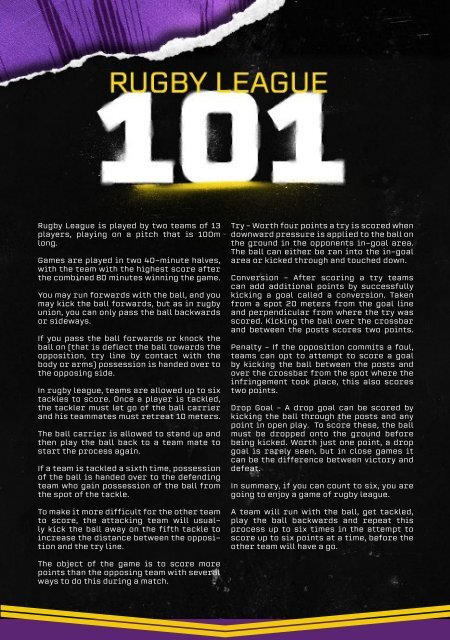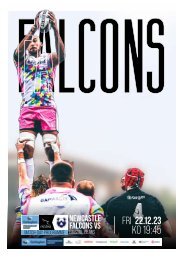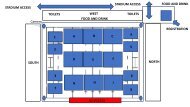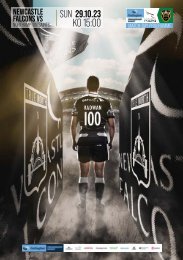Newcastle Thunder vs Barrow Raiders 2022
Create successful ePaper yourself
Turn your PDF publications into a flip-book with our unique Google optimized e-Paper software.
Ball Steal<br />
Not 10<br />
Rugby League is played by two teams of 13<br />
players, playing on a pitch that is 100m<br />
long.<br />
Games are played in two 40-minute halves,<br />
with the team with the highest score after<br />
the combined 80 minutes winning the game.<br />
You may run forwards with the ball, and you<br />
may kick the ball forwards, but as in rugby<br />
union, you can only pass the ball backwards<br />
or sideways.<br />
If you pass the ball forwards or knock the<br />
ball on (that is deflect the ball towards the<br />
opposition, try line by contact with the<br />
body or arms) possession is handed over to<br />
the opposing side.<br />
In rugby league, teams are allowed up to six<br />
tackles to score. Once a player is tackled,<br />
the tackler must let go of the ball carrier<br />
and his teammates must retreat 10 meters.<br />
The ball carrier is allowed to stand up and<br />
then play the ball back to a team mate to<br />
start the process again.<br />
If a team is tackled a sixth time, possession<br />
of the ball is handed over to the defending<br />
team who gain possession of the ball from<br />
the spot of the tackle.<br />
Try – Worth four points a try is scored when<br />
downward pressure is applied to the ball on<br />
the ground in the opponents in-goal area.<br />
The ball can either be ran into the in-goal<br />
area or kicked through and touched down.<br />
Conversion – After scoring a try teams<br />
can add additional points by successfully<br />
kicking a goal called a conversion. Taken<br />
from a spot 20 meters from the goal line<br />
and perpendicular from where the try was<br />
scored. Kicking the ball over the crossbar<br />
and between the posts scores two points.<br />
Penalty – If the opposition commits a foul,<br />
teams can opt to attempt to score a goal<br />
by kicking the ball between the posts and<br />
over the crossbar from the spot where the<br />
infringement took place, this also scores<br />
two points.<br />
Drop Goal – A drop goal can be scored by<br />
kicking the ball through the posts and any<br />
point in open play. To score these, the ball<br />
must be dropped onto the ground before<br />
being kicked. Worth just one point, a drop<br />
goal is rarely seen, but in close games it<br />
can be the difference between victory and<br />
defeat.<br />
In summary, if you can count to six, you are<br />
going to enjoy a game of rugby league.<br />
When two or more people are involved in<br />
a tackle, a ball steal occurs when a player<br />
from the defending team takes the ball off<br />
the attacking player who has been tackled.<br />
Dissent<br />
If a player disputes decisions taken by the<br />
referee or verbally abuses the officials<br />
then a penalty for dissent may be awarded.<br />
Double Movement<br />
If the ball carrier is tackled and held before<br />
the try line and then lifts their arm<br />
to reach out and place the ball over the try<br />
line, this is classed as a double movement<br />
with a penalty awarded to the defending<br />
team<br />
High Tackle<br />
If a defending player contacts the head of<br />
the attacking player carrying the ball, a<br />
penalty for a high tackle will be awarded.<br />
Late Tackle<br />
If the attacking player passes the ball to a<br />
team-mate and the defender has had time<br />
to pull out of his attempted tackle but carries<br />
through, he has committed a late tackle<br />
and will be penalised.<br />
When a player doesn’t retreat behind the<br />
next 10m line or goes too early when defending<br />
the next tackle of a set, a penalty<br />
will be awarded. This can also be awarded<br />
as an offside penalty.<br />
Obstruction<br />
When an attacker prevents a defender from<br />
getting to the ball carrier to effect a tackle<br />
by getting in between the two players, a<br />
penalty is awarded for obstruction<br />
Offside<br />
As well as an infringement around being<br />
10m from the play the ball, offsides can also<br />
be awarded in instances where players are<br />
in front of a kicker.<br />
Tackle in the air<br />
If a player has jumped to take the ball in the<br />
air and the defending player makes no attempt<br />
to play at the ball, but instead goes<br />
straight for the player or makes a tackle<br />
before the gathering player returns to the<br />
ground, a penalty will be awarded<br />
For a host of other offences, referees will<br />
simply reset the tackle count bay awarding<br />
a “Six Again”<br />
This is signaled by the referee waving a<br />
clenched fist above his head from left to<br />
right.<br />
To make it more difficult for the other team<br />
to score, the attacking team will usually<br />
kick the ball away on the fifth tackle to<br />
increase the distance between the opposition<br />
and the try line.<br />
A team will run with the ball, get tackled,<br />
play the ball backwards and repeat this<br />
process up to six times in the attempt to<br />
score up to six points at a time, before the<br />
other team will have a go.<br />
The object of the game is to score more<br />
points than the opposing team with several<br />
ways to do this during a match.

















